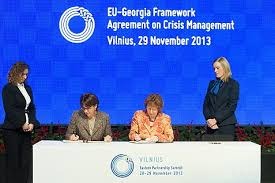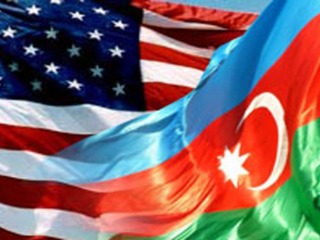NATO summit makes progress with problems
By Richard Weitz
August 24th, 2016, The CACI Analyst
NATO’s Warsaw summit on July 8-9 made progress in strengthening Baltic security, enhancing the alliance’s counterterrorism and cyber defense capabilities, and strengthening relations with the European Union (EU). But the alliance has still not solved the challenge of ensuring the security of non-member states, including Afghanistan as well the countries of Central Asia and the South Caucasus.
Kyrgyzstan’s President Makes Unannounced Visit to Moldova
By Arslan Sabyrbekov (04/01/2015 issue of the CACI Analyst)
The unofficial visit to Moldova’s capital Chisinau of Kyrgyzstan’s President, on the private jet of one of the country’s influential oligarchs, has spawned different opinions among the Kyrgyz public. The country’s leading opposition forces have sharply criticized the visit and demanded immediate clarification from the president.
On March 15, President Atambayev’s press service released official information on his upcoming visit to Saint Petersburg to hold bilateral talks with his Russian counterpart Vladimir Putin. Later, a number of media sources reported that before heading to Russia, Atambayev also visited Chisinau for several hours to speak with the local oligarch and deputy head of Moldova’s Democratic Party, Vlad Plahotniuc, who even provided his private jet to the Kyrgyz President.
During his short stay in Chisinau, Atambayev did not meet Moldova’s President Nicolae Timofti or any other high-ranking state officials, a gesture described by many experts to be highly undiplomatic. In explanation, Timofti’s press secretary told local media that Kyrgyzstan’s President was short on time to organize a meeting of two heads of states and confirmed that he instead met “someone” in Chisinau. That “someone’s” reputation in Moldova has raised further widespread criticism of the Kyrgyz President. According to Chisinau-based political analyst Igor Bocan, Atambayev’s interlocutor is considered Moldova’s richest man and one of the most influential figures in the country, controlling a number of economic spheres including the banking sector. Plahotniuc has earlier been involved in legal scandals related to his business activities in the United Kingdom and the Netherlands, noted Bocan.
The unannounced or rather secretive visit to Chisinau immediately activated the Kyrgyz opposition. During a session of the Kyrgyz Parliament, opposition MP and leader of the United Opposition Movement Ravshan Jeenbekov criticized the President for using someone’s private jet and demanded an explanation of the visit’s purpose. In his words, “as head of an independent state, the president has no right to use someone’s private jet and the Kyrgyz public has the full right to know where the Kyrgyz president was, which meetings he held and what subjects were discussed.” Jeenbekov has further suggested creating a special commission to investigate the matter and draw concrete conclusions. Following a number of similar critical remarks, the head of the Presidential Administration’s foreign relations department Sapar Isakov released a statement noting, “it is not yet time to comment Almazbek Atambayev’s unofficial meeting in Chisinau, but I could clearly state that this visit, just like all other activities of the president, was dictated by the national interests of the Kyrgyz Republic.” Isakov refrained from giving any further comments.
Kyrgyz and Moldovan news media are prodding the real purpose of the Kyrgyz president’s brief meeting with Moldova’s controversial oligarch and politician. A number of experts claim that the two might have discussed Moldova’s perspective of joining the Russia-led Eurasian Economic Union, with the Kyrgyz president being the Kremlin’s messenger. Others argue that the meeting exclusively focused on business related issues. Nevertheless, this is not the first time that Kyrgyzstan’s highest state official held secret talks with foreign oligarchs. During the tenure of the ousted President Kurmanbek Bakiev, media reported on his secret meeting with Russian oligarch Boris Berezovsky, who was then wanted by Russian prosecutors for a number of criminal charges, ranging from financial fraud to engineering a putsch.
After his controversial visit to Chisinau, Kyrgyzstan’s president flew on the same jet to Saint Petersburg to meet his Russian counterpart. This was Putin’s first public appearance in more than a week, leading to various rumors of his whereabouts. Atambayev said, “They are not very correct.” He added that “The Russian President not just goes out for strolls, but takes the seat at the wheel to take his guests for a fast ride.”
Currently, Kyrgyzstan’s president is paying official visits to a number of European countries and has met with the Austrian, Swiss and French presidents. The Kyrgyz delegation is expected to hold talks with German Chancellor Angela Merkel and President Joachim Gauck in Berlin in the beginning of April.
The author writes in his personal capacity. The views expressed are his own and do not represent the views of the organization for which he works.
“CACI Analyst, December 11, 2013”
Reaching The Summit: Implications of Vilnius for Georgia
By Stephen Jones (the 11/12/2013 issue of the CACI Analyst)
The November 29 initialing of Association Agreements (AA) in Vilnius between the EU on the one hand, and Georgia and Moldova on the other, have been interpreted almost exclusively in geo-political terms. The reasons for this are at least twofold: Armenia’s and Ukraine's withdrawal from their initial commitment to sign under pressure from Russia, and Russia’s own intervention in the process. Russia, behaving like something between a regional hegemon and a Cold War remnant defending its sphere of influence, framed the Vilnius Summit as a stark choice between East and West.

The Strategic Context of U.S.-Azerbaijan Relations after the Presidential Elections
By Mamuka Tsereteli (the 27/11/2013 issue of the CACI Analyst)
On October 9, 2013, Azerbaijan held presidential elections and incumbent president Ilham Aliyev was re-elected for another five year term. The OSCE ODIHR observer mission, as well as the U.S. government, issued critical statements about the conduct of elections by Azerbaijani authorities that created tensions in Azerbaijan’s relationships with Western allies. Issues of concern need to be addressed, but they should not disrupt Western engagement and critical support for Azerbaijan’s sovereignty against the backdrop of assertive Russian policies to limit the Western presence in the broader Eastern European and Central Eurasian Space.




